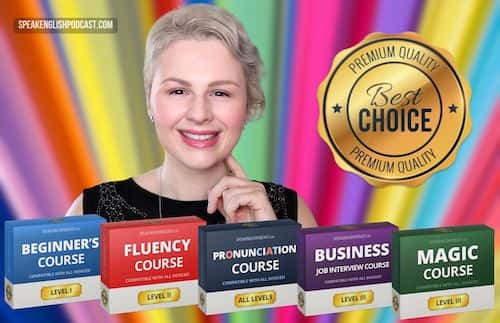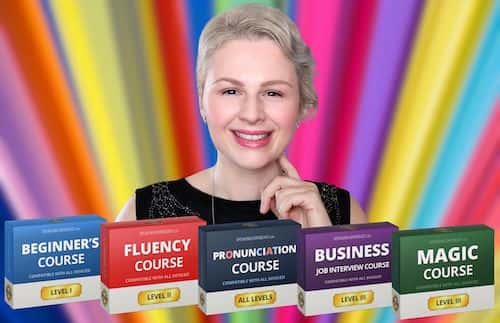#301 Learn English with Dad Jokes 1
Transcript:
Today, we're diving into the world of dad jokes and how they can help you improve your English skills. Dad jokes are funny and a great way to have fun while learning.
Hi! I'm Georgiana, and I'm back with a new episode. I'm here to help you speak English fluently. And what do you need to speak fluently? You need to LISTEN, LISTEN, LISTEN, and LISTEN. 🙂
If you want to help me, SHARE the podcast with your friends and family. That would mean a lot. Thanks.
On my website you can get the 5 Secrets to speak English and also my premium courses.
Before we start, get the transcript: SpeakEnglishPodcast.com/podcast
It's completely free!
Ok, let's start!
The Essence of Dad Jokes
These jokes are short and funny. Dads use them to make their kids laugh. They are simple, with clever twists on words we use every day.
What is a pun?
A pun is a kind of joke that plays with words that sound the same or have multiple meanings. It's like a riddle made of words.
For example, imagine a joke that says, 'I used to be a baker, but I couldn't make enough dough.' In this joke, 'dough' means the stuff we use to make bread but also, the money we earn.
So, it's funny because it means the person couldn't make enough bread dough and also couldn't make enough money.
Puns are a fun way to use words differently to make people laugh or think.
Expression "No pun intended:"
When someone says, 'No pun intended,' they're telling you they made a little joke but didn't mean to. It's like saying, 'I didn't try to be funny, but it turned out that way.'
For example, if someone says, 'I'm feeling a bit down today, no pun intended,' they mean they feel sad, since the word 'down' can also mean 'lower.'
So, it's a joke, but they want to make sure you know they didn't mean to be funny.
Let's get to the fun part and learn some Dad Jokes:
What do you call cheese that isn't yours? Nacho cheese!
The humor in this joke comes from a pun, where 'nacho' sounds like 'not your.' So, when it says 'nacho cheese,' it's making a funny connection that cheese that doesn't belong to you is called 'nacho cheese.'
I told my wife she was drawing her eyebrows too high. She looked surprised.
This means the woman is using makeup to raise her eyebrows.
The funny part is when it says, 'She looked surprised.' Usually, when someone looks 'surprised,' they show shock or amazement. But in this joke, it's funny because the wife's eyebrows are drawn too high, so she looks 'surprised' all the time, even when she might not actually be surprised.
So, the joke is a friendly way of teasing someone about their eyebrow makeup, suggesting that it makes them look like they're always surprised. It plays with the two meanings of 'surprised.'
Let's learn one more dad joke:
Why don't eggs tell jokes? They would crack each other up.
Think about eggs, like the ones you have for breakfast. When we say "crack each other up," it usually means making someone laugh a lot. But here's the funny part: "crack" can also mean to break something, like an eggshell.
So, imagine if eggs could tell jokes. If they did, they would laugh so hard they would break their shells. It's like saying they'd laugh so much they would break themselves!
Before we continue with the next section, visit my website: SpeakEnglishpodcast.com/courses and get my premium courses. There are several levels. If you can't decide which one is for you, just send me a message by using my website contact form.
Great! Let's continue with a point-of-view lesson.
POV-Story (Learn grammar in context)
I will tell you the same story twice. So, make sure to focus on the changes.
You can find these techniques fully implemented in my premium courses.
SpeakEnglishPodcast.com/courses
Okay! Let’s start!
Joe and Lisa lived in a cozy apartment building. Joe was a cheerful man who loved to tell jokes, especially 'dad jokes,' which are known for being a bit silly. So, Lisa, his teenage daughter, didn't really like them.
One day, Joe and Lisa took the elevator instead of the stairs. But as they rode up, the elevator suddenly stopped working, leaving them stuck between floors.
While they waited for help to arrive, Joe tried to cheer Lisa up by telling his jokes. "Why did the tomato turn red? Because it saw the salad dressing!" Jose chuckled, hoping to make her smile.
But Lisa just sighed and rolled her eyes. "Dad, can't we just wait quietly?" she said, slightly annoyed.
But Joe continued with his jokes. "What do you call cheese that isn't yours? Nacho cheese!" he joked, hoping to lighten the mood.
But Lisa still didn't find it funny. She just stared at the elevator doors, feeling bored and frustrated.
As they waited, Joe kept telling his jokes, one after another. But then, something unexpected happened. One of Joe's jokes made Lisa giggle. It was a small laugh, but enough to brighten his day.
When the firefighters finally arrived to rescue them, they found Joe and Lisa laughing together. Despite the situation, they were enjoying each other's company.
As they walked out of the elevator, Joe told Lisa: "See, my jokes aren't so bad after all, huh?" he grinned.
Lisa smiled and nodded. "Yeah, I guess they're not so bad," she admitted. And from that day on, she started to appreciate her dad's jokes more.
Let's listen to the same story from Lisa's viewpoint:
My dad and I lived together in a cozy apartment building. He was always cheerful and loved telling jokes, especially 'dad jokes' that are known for being a bit silly. But as his teenage daughter, I didn't really like them much.
One day, we decided to take the elevator instead of the stairs. But as we rode up, the elevator suddenly stopped working, and we were stuck between floors.
While waiting for help, my dad tried to cheer me up by telling jokes. "Why did the tomato turn red? Because it saw the salad dressing!" he chuckled, hoping to make me smile.
But I just sighed and rolled my eyes. "Dad, can't we just wait quietly?"
But he kept going with his jokes. "What do you call cheese that isn't yours? Nacho cheese!"
I still didn't find it funny and stared at the elevator doors, feeling bored and frustrated. As we waited, my dad continued telling his jokes, one after another. But then, the unexpected happened! One of his jokes made me giggle. It was a small laugh but enough to brighten his day.
When the firefighters finally arrived to rescue us, they found us laughing together. Despite the situation, we were enjoying each other's company.
As we left the elevator, my dad said:"See, my jokes aren't so bad after all, huh?" he grinned.
I smiled and nodded. "Yeah, I guess they're not so bad." And from that day on, I started to appreciate my dad's jokes more.
Great! I like these kinds of stories because they're easy to remember and help a lot with learning English. Humor also makes learning more enjoyable. You can find this method in my premium courses—take a look at:
SpeakEnglishPodcast.com/courses, to get my premium courses. They are designed for learning by listening.
Also, if you want to help me, share the podcast with your friends and family. That would mean a lot. Thanks!

 Get my Premium Fluency Courses
Get my Premium Fluency Courses Get my Premium Fluency Courses
Get my Premium Fluency Courses
0 Comments